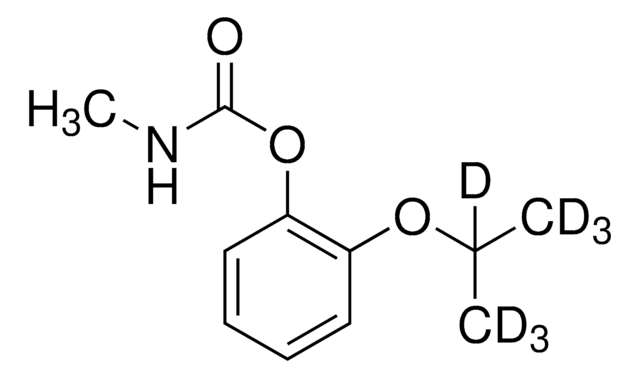About This Item
Recommended Products
vapor density
4 (vs air)
Quality Level
vapor pressure
15 mmHg ( 25 °C)
8 mmHg ( 20 °C)
Assay
99.7%
form
liquid
autoignition temp.
790 °F
purified by
glass distillation
expl. lim.
7.6 %
technique(s)
HPLC: suitable
impurities
≤0.05% water
evapn. residue
<0.0005%
refractive index
n20/D 1.394 (lit.)
pH
6.2 (20 °C, 5.3 g/L)
bp
124-126 °C (lit.)
mp
−78 °C (lit.)
density
0.88 g/mL at 25 °C (lit.)
λ
H2O reference
UV absorption
λ: 254 nm Amax: 1.0
λ: 260 nm Amax: 0.20
λ: 275 nm Amax: 0.04
λ: 300 nm Amax: 0.02
λ: 320-400 nm Amax: 0.01
application(s)
food and beverages
SMILES string
CCCCOC(C)=O
InChI
1S/C6H12O2/c1-3-4-5-8-6(2)7/h3-5H2,1-2H3
InChI key
DKPFZGUDAPQIHT-UHFFFAOYSA-N
Looking for similar products? Visit Product Comparison Guide
Related Categories
Application
- Fast Interfacial Defluorination Kinetics Enables Stable Cycling of Low-Temperature Lithium Metal Batteries.: Utilizing 2-Methyltetrahydrofuran as an electrolyte solvent, this research showcases how its unique properties contribute to the development of low-temperature lithium metal batteries with enhanced stability and efficiency, highlighting its critical role in advancing renewable energy technologies (Li et al., 2024).
- α-Cleavage of 2,2-Diazido-2,3-dihydroinden-1-one in Solution and Cryogenic Matrices.: Demonstrating the use of 2-Methyltetrahydrofuran as a reaction medium, this study explores its effectiveness in facilitating controlled organic reactions under both solution and cryogenic conditions, providing insights into the mechanism of complex molecular transformations (James et al., 2024).
- Solvent-Assisted Control of Metal-Organic Nanotube Size and Morphology.: This publication details the use of 2-Methyltetrahydrofuran in the synthesis of metal-organic frameworks, particularly focusing on its role in manipulating the size and shape of nanotubes, which are crucial for applications in catalysis and gas storage (Rosenmann et al., 2024).
- Coordination Variations within Binuclear Copper Dioxygen-Derived (Hydro)Peroxo and Superoxo Species; Influences upon Thermodynamic and Electronic Properties.: Research utilizing 2-Methyltetrahydrofuran explores its application in complex inorganic chemistry, particularly in stabilizing reactive copper dioxygen complexes that are significant in biochemical oxygen transport and utilization (Hota et al., 2024).
- Sustainable Green Extraction of Carotenoid Pigments: Innovative Technologies and Bio-Based Solvents.: This review highlights the role of 2-Methyltetrahydrofuran as a green solvent in the extraction of carotenoids, emphasizing its benefits in terms of efficiency and sustainability, and supporting the shift towards environmentally friendly extraction technologies (Morón-Ortiz et al., 2024).
Signal Word
Warning
Hazard Statements
Precautionary Statements
Hazard Classifications
Flam. Liq. 3 - STOT SE 3
Target Organs
Central nervous system
Supplementary Hazards
Storage Class Code
3 - Flammable liquids
WGK
WGK 1
Flash Point(F)
80.6 °F - closed cup
Flash Point(C)
27 °C - closed cup
Certificates of Analysis (COA)
Search for Certificates of Analysis (COA) by entering the products Lot/Batch Number. Lot and Batch Numbers can be found on a product’s label following the words ‘Lot’ or ‘Batch’.
Already Own This Product?
Find documentation for the products that you have recently purchased in the Document Library.
Customers Also Viewed
Our team of scientists has experience in all areas of research including Life Science, Material Science, Chemical Synthesis, Chromatography, Analytical and many others.
Contact Technical Service









